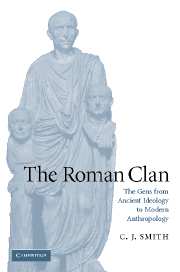Book contents
- Frontmatter
- Contents
- List of illustrations
- Preface
- List of abbreviations
- General introduction
- Part I THE EVIDENCE FOR THE GENS
- Part II TOWARDS AN INTERPRETATION OF THE GENS
- Chapter 5 The Roman community
- Chapter 6 The Roman curiae
- Chapter 7 The patricians and the land
- Chapter 8 The patriciate
- Chapter 9 Warfare in the regal and early Republican periods
- Chapter 10 Explaining the gens
- Chapter 11 Roman history and the modern world
- Appendix 1 Dionysius of Halicarnassus on the Roman curiae and religion
- Appendix 2 The missing curiae
- Select bibliography
- General index
- Index of ancient persons
- Index of passages discussed
Chapter 8 - The patriciate
Published online by Cambridge University Press: 22 September 2009
- Frontmatter
- Contents
- List of illustrations
- Preface
- List of abbreviations
- General introduction
- Part I THE EVIDENCE FOR THE GENS
- Part II TOWARDS AN INTERPRETATION OF THE GENS
- Chapter 5 The Roman community
- Chapter 6 The Roman curiae
- Chapter 7 The patricians and the land
- Chapter 8 The patriciate
- Chapter 9 Warfare in the regal and early Republican periods
- Chapter 10 Explaining the gens
- Chapter 11 Roman history and the modern world
- Appendix 1 Dionysius of Halicarnassus on the Roman curiae and religion
- Appendix 2 The missing curiae
- Select bibliography
- General index
- Index of ancient persons
- Index of passages discussed
Summary
INTRODUCTION
Although we take it for granted that the patriciate is a central feature of the Roman social structure, it is surprisingly difficult to pin down. We know that various important priesthoods were confined to patricians and we know that several political offices were at one time confined to patricians, but that over time the plebeians successfully gained access to these offices; the consulship is the obvious example. Various claims of exclusivity could be made about the patriciate, and as we have seen, one relates to the gens, though other definitions were less flattering, for instance the claim that a patrician was simply someone who could name his father. They clearly had a strong sense of identity – they even had a special shoe (the calceus patricius). In fact, the patriciate is not nearly as straightforward an institution as it might at first sight appear, and, rather like the aristocracies of Greece, the Bacchiadai or the Eupatridai, it is easier to understand in the broad than in the detail. The purpose of this section is to examine the patriciate more closely, to see what other characteristics it had which might be relevant to our larger enquiry; and that will also take us into a consideration of the nature of the early senate and of the emergence of the plebeians. We shall see that definitions of the patriciate by patricians, and by others, were often tendentious.
- Type
- Chapter
- Information
- The Roman ClanThe Gens from Ancient Ideology to Modern Anthropology, pp. 251 - 280Publisher: Cambridge University PressPrint publication year: 2006

